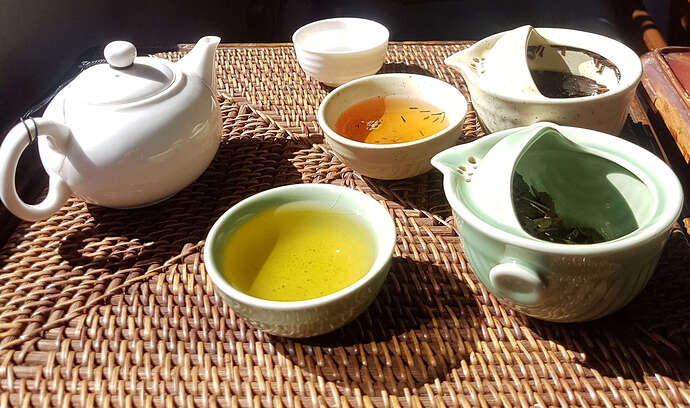I have often wondered why more people don’t get into tea, or at least into good tea. I enjoy coffee and many other drinks, but in my view the huge variety of teas - and the many fascinating processes and practices that go into making them - make it one of the more unique and enjoyable drinks one can have. I have some theories about the reasons for tea’s lack of “cool”, especially in the US, and I’m attempting to write some of that up here.
Put simply, think there is a big gulf in accessibility (not in practical but more in psychological terms) between the ultra casual boxed/bagged tea of the supermarket or your average café, and the actually genuinely better tasting loose leaf available at a dedicated tea retailer or perhaps in bulk at certain supermarkets and dedicated online retailers. The latter is almost inarguably a better experience, but it comes with a lot of apparent complexity around brewing times, temperatures, and other things that I think puts people off. And I think this is unnecessary, at least to some degree. Over time I’d like to elaborate more on all that and provide an alternate philosophy and approach for how to get into “serious” tea without becoming too serious yourself. 
Although almost every drink we have today has a process or practice involved in making it, and coffee making can get very serious indeed, I think there is something in the sheer variety of tea and its preparation methods that can perhaps make it feel intimidating. Not only are there many different categories and sub-categories (black, white, green, etc.), but each of these comes with its own preparation guidelines, and knowledge of what is good to mix with it (milk vs. lemon vs. sugar, etc.) and not. One can certainly get into coffee enough to be using different brewing methods and times for maximum quality and taste, but this is not something that is widely promoted.
As an illustration of the difference, if you walk down the tea aisle in any store (and consider that any bagged tea at all is far lower on the “serious enthusiast” bar than, say, whole coffee beans), you’ll see many, many teas, each of which probably has brew instructions on the side, which can vary anywhere from under a minute (30 seconds, for example), to 5 minutes or more, and with varying temperature of water in many cases. While coffee brewing can perhaps be as complex, you will generally not see such depth covered on the coffee packaging itself and thus it is something you don’t have to confront immediately as a potential consumer. With tea apparent complexity is somewhat built-in to the product and process of making it. And I wonder if this doesn’t turn some people off…
The truth is that all tea brewing times and temperatures are mere guidelines. They produce a result that someone has decided is “good” or “ideal” for that type of tea. In many cases this is designed to minimize “excess” bitterness, for example. But some people will of course prefer more bitterness. So really what you want to do is experiment with tea brewing to find what you like best for each type of tea. And I’ve also found that in general tea can be fairly forgiving and you can set general rules that are more broad and easy to remember, e.g. "brew average green teas at 185f for 4-5 mins, and will work most of the time. Each of those teas might have a suggested brew time from 2-5 minutes and temp anywhere from 160f to 195f, but in many cases you can get an enjoyable and easy result from averaging.
In trying to find your own preferences by experimentation, it also helps to understand the relationship between temperature, brew time, and resulting flavors and other qualities. This helps you arrive at a pleasant result more quickly. Generally speaking the higher temperature you brew something at, the more bitterness will come out, often associated with tannins in the tea. Longer brewing can also have this effect, but high temperature causes it much more quickly. You can brew something at 195 for a mere minute or two and get a bitter result, whereas you can brew the same tea at 165 for 5+ minutes and get much less bitterness. Longer brew times likewise bring out other qualities, “brothiness” and vegetal or umami qualities, for example. For this reason I often try to brew my teas at lower temperatures for longer. But there is no hard rule about any of it, just correlations to be aware of as you choose your own experiments and find what works for you!
